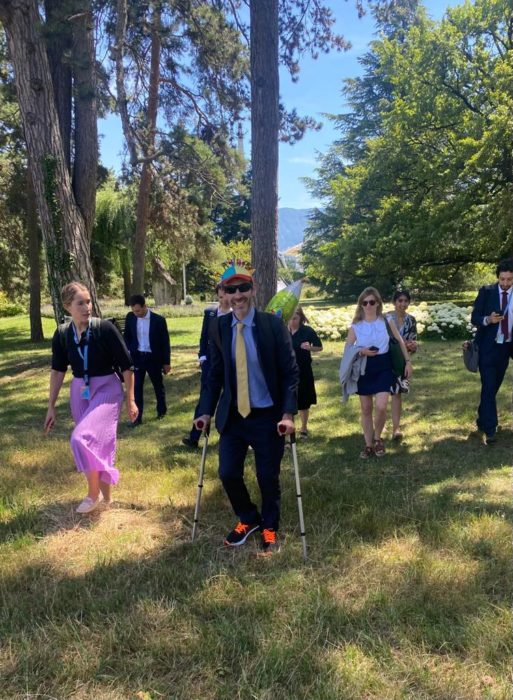One thing I’d somehow managed for the first 52 Council sessions, was to avoid serious injury. The odd week of Covid, a minor bout of pneumonia, and some less-than-pleasant food poisoning misadventures aside, I’ve kept myself in functional working shape these last 20-plus years. I’d like to say good shape, but let’s not get carried away.
So I was surprised to find out I’d broken my leg, after a less than starring role in a village football tournament just before the session began. (It seems the Swiss locals aren’t always conflict shy). I walked around on it for 10 days before discovering it was broken – admittedly not the smartest move – but one done out of physiological ignorance, not Manchester machismo.
Coordination and fine motor skills have never been my strong point, and I can’t say crutches brought out the best in me, but the session was otherwise fairly straightforward for the first two weeks. Quite a few of the negotiations dragged on much longer than they needed to, but the mood overall was cordial enough.
In week one, the Council’s Expert on Sexual Orientation and Gender Identity, the outstanding Victor Madrigal-Borloz, presented his last report after a 6-year stint. There was a rightful outpouring of appreciation for his incredible work, and it was a happy opportunity to reflect on how far we’d come since the watershed resolution on SOGI in 2011. Before that, the idea of a resolution on SOGI tested the limits of imagination, and the prospect of a dedicated mandate was unthinkable. But, as became abundantly clear later in the session, we are still a long way from agreement on these issues.
Unfortunately, everything went rapidly downhill in the final stages of the session. In the last week, the Council held an Urgent Debate on religious hatred, called by the Organisation for Islamic Cooperation (OIC), in response to the recent burning of the Quran in Sweden on Eid Al Adha. All Council members agreed to the debate, in recognition of the seriousness of the issue and the need to hear concerns. During the debate itself there was a high degree of commonality among states speaking out to oppose the burning of the Quran, to recognise the deep pain and offence caused to Muslims throughout the world, and to call for greater dialogue respect and mutual understanding. Regrettably, there was division on the resolution which followed the debate, with the EU calling a vote and all western countries voting no. The main disagreement was over how the resolution set out the balance between the condemnation and prevention of religious intolerance and hatred, and the protection of freedom of expression. The Council had managed to navigate this tricky balance through its breakthrough resolution 16/18 in 2011, when Türkiye, Pakistan, the US and the UK brokered a framework to guide action for over 12 years. This time, agreement felt within reach but ultimately proved elusive, not helped by heightened emotions, and a very condensed timeframe. The outcome was a sad moment, which left many in the room deflated, though with a sense that we need to do better next time.
During the vote, China betrayed no sense of hypocrisy in denouncing Islamophobia in Europe, despite the devastating UN report last year on China’s persecution of its Uyghur minority in Xinjiang. In that report, the High Commissioner for Human Rights had pointed to the possible commission of crimes against humanity, the destruction of mosques, large-scale arbitrary detention, the conflation of religious expression with terrorism, and possible forced sterilisation of women. With the exception of Somalia, none of the Council’s OIC members supported last September’s proposal to have a debate on Xinjiang. Hopefully, some of them will rethink their approach in future.
The session saw further attempts to weaken existing standards on the rights of women and girls through amendments to both the Canadian resolution on violence against women and girls, and the Dutch-led initiative on child, early and forced marriage. Thankfully, all the amendments failed. But these were deeply troubling and reflect wider attacks on women’s and girls’ rights across the international system.
My personal highlight of the session was the resolution on Colombia, led by Ambassador Gallon. The Colombian Ambassador used to come to Geneva 20 years as a human rights defender, raising concerns about his country and urging the Government to maintain its UN’s human rights office. Negotiations were always fraught, and on one occasion the Colombian government were so displeased with the UK’s forward-leaning position that the then Foreign Minister called in our Ambassador to make a personal complaint about me. So it was heart-warming to see Ambassador Gallon leading a resolution asking for increased UN support, and for a human rights expert to be appointed to help the country move forward. During the voting Pakistan, on behalf of the OIC, caused consternation by trying to remove a reference to the words “sexual orientation and gender identity”, saying that they do not accept this terminology, before calling a vote on the resolution. The UN had identified LBGTIQ+ persons as among those who had been disproportionately affected by violence in Colombia, and it really should not have been for others to object. Colombia deserves a huge amount credit for defending its values, but it was another sign of how far we have to go to recognise the rights of everyone at the UN.
I wish you all a restful summer. By the time we get back in September my wounds from the current session should have healed. I hope that after getting some rest, the Council will be back to its brilliant best too.

